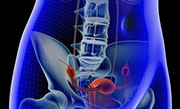Findings in Japanese women aged 45 to 74 years followed during average of 12.1 years
FRIDAY, Feb. 6, 2015 (HealthDay News) — Soy food/isoflavone intake is not associated with endometrial cancer risk in Japanese women, according to a study published in the February issue of BJOG: An International Journal of Obstetrics & Gynaecology.
Sanjeev Budhathoki, M.D., from the National Cancer Center in Tokyo, and colleagues conducted a prospective cohort study involving 49,121 women aged 45 to 74 years to examine the correlation between soy food/isoflavone intake and endometrial cancer risk. Intake of soy foods and other covariates were assessed by a self-administered food frequency questionnaire, completed in 1995 to 1998. Participants responded to a five-year follow-up survey questionnaire.
During an average follow-up of 12.1 years, the researchers identified 112 newly diagnosed endometrial cancer cases. There was no correlation between energy-adjusted intakes of soy food and isoflavone and the risk of endometrial cancer. Per 25 g/day increase in the intake of soy food, the multivariate-adjusted hazard ratio was 1.02 (95 percent confidence interval, 0.94 to 1.1); for an increase of 15 mg/day in isoflavone intake, the corresponding hazard ratio was 1.01 (95 percent confidence interval, 0.84 to 1.22).
“In this population-based prospective cohort study of Japanese women, we observed no evidence of a protective association between soy food or isoflavone intake and endometrial cancer risk,” the authors write.
Copyright © 2015 HealthDay. All rights reserved.








